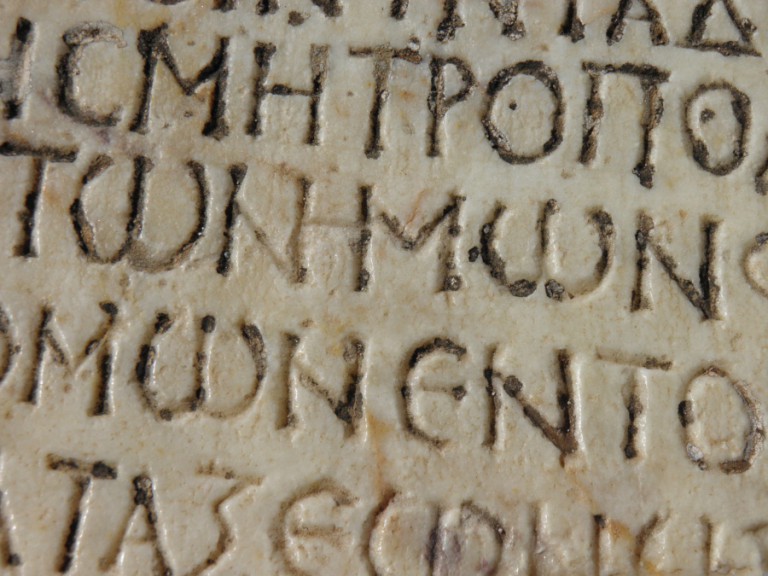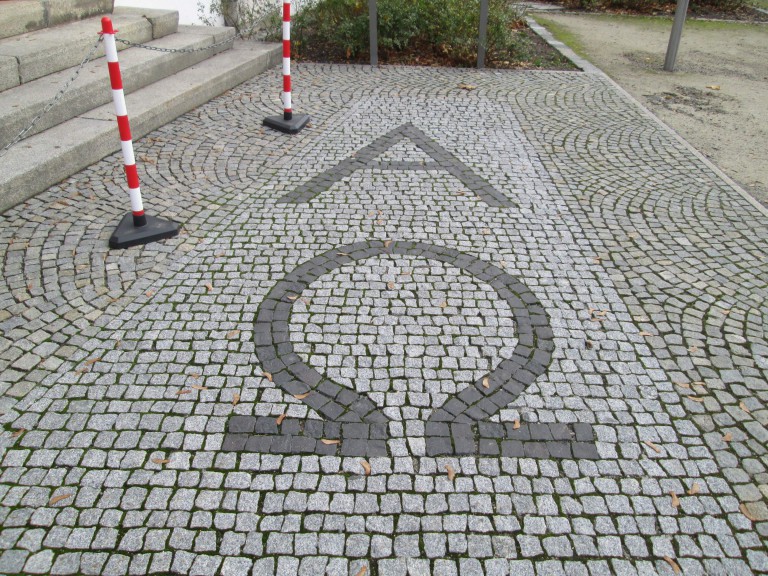There’s a Latin saying, “Graeca sunt, non leguntur“, which means, “it’s Greek, it can’t be read”. Something akin to “it’s all Greek to me”. Such a difficult language, with its strange alphabet. How could one possibly learn it, right?
And yet, most European languages carry a heavy burden of Greek words in their vocabulary. Even though their speakers might not realize it. Here is an example of how many Greek words there are in German, either adopted exactly as they were or slightly changed during their transcription:
euphonisch, euphorisch, sporadisch, rhetorisch, komisch, tragisch, archaisch, Lexikon, Katalysator, trapezoid, Monogamie, chromolithographie, kyrillisch, Xylophon, Krypta, Haptik, and many others.
There is an impressive list in English, too:
labyrinth, problem, empathy (which, however, in modern Greek means to be passionately prejudiced against someone), paradox, oxymoron, euphemism, tantalising, sisyphean, perimeter, hypothesis, parallel, gastronomy, ethics, geology, genetic, hieroglyphics, atheist, epic, plastic, rhinoceros, hippopotamus, melodramatic, etcetera (which is Latin, as it happens!).
The list goes on for French, Italian, Spanish, to name but a few. Everywhere you look, you’ll discover a Greek word that found its way into the Latin language. Probably with the rise of Rome and the fall of ancient Greece.

“Almost everything that men have said best has been said in Greek“ – Marguerite Yourcenar, Memoirs of Hadrian
“I have turned my entire attention to Greek. First thing I shall do, as soon as the money arrives, is to buy some Greek authors; after that, I shall buy clothes” Erasmus, from Collected Works of Erasmus, Vol 1 (1974).
Some letters of the Greek alphabet are used in mathematics and geometry, like the famous π.
Medicine, pharmacology, and biology feel at home in Greece. Honouring Hippocrates and Asclepius, they use words that the two wise men had probably used too, in order to describe diseases and sectors of those sciences. Ophthalmology, gynaecology, psychology and other -ologies all have Greek origins, whereas the word “medicine” itself comes from Latin. Legal science has opted for Latin terminology as well. Sometimes there are some unpleasant surprises for us Greeks when we encounter, for example, a word like proxénéte which in French means “pimp” but in Greek means simply “the matchmaker”.

There is a newly discovered Greek patriotism, which sometimes is unpleasant as it could border on nationalism. The Greeks of today are proud of their linguistic heritage. They tend to forget that it is actually thanks to the European humanists of the 17th and 18th centuries that the ancient Greek texts were rediscovered and given a new lease on life. The Philhellenes helped the cause of Greek independence and contributed to this love of everything Greek. Undoubtedly our glorious ancestors, the ancient Greeks, presented Europe with the foundations for today’s civilization. But this happened a long time ago.
Today most of my fellow Greeks can hardly read Homer or Plato in the original.
In the past decades, there have been many changes in the educational system. The younger generations are no longer able to understand the roots of their language. I belong to the last generation that studied the Odyssey in the original text at school. Today a major crime is being committed in Greece. A series of reforms in education has drastically reduced the learning of ancient Greek at school. This has changed the grammar of modern Greek. Something like the Rechtschreibung in German, but try to imagine this on a much larger scale. Removing all the accents which had a historical, but also a real significance in the way we heard and pronounced the vowels. Although we did it mechanically and without realizing it.

This has now been stigmatized as “old fashioned”, or even worse–as conservative. It has practically forbidden the use of the Katharevousa. A mixture of ancient and modern Greek which we used mainly for writing official, but also literary texts. In Greece, nobody speaks of this problem. If you dare touch this taboo subject, you will be scolded and waved aside as a fool, even as a fascist. A word so abused that it has come to indicate those who use it in order to accuse others as the real fascists. No one mentions that all these reforms are the actual cause of the social and political, even the financial crisis in the country.
And yet, ”The limits of my language mean the limits of my world,” as Wittgenstein said.
If people have narrow boundaries in their language, then they have narrow boundaries in their world, their thoughts, and their culture. With the “help” of technology (another Grecian word), the rich and unique Greek alphabet is slowly being replaced by so-called Greeklish. A terrible invention that writes Greek words with Latin characters. The kids feel it’s cool to write in Greeklish and, turning their backs on a history of thousands of years, they also prefer the Latin question mark (?) to the traditional one. Don’t ask me why, it’s all Greek to me.
But more seriously now, for the Christian church, Alpha and Omega, the first and last letters of the Greek alphabet, are highly significant. They were given to Jesus as an honorary title: the beginning and the end of everything. Theology, eucharist, synagogue, ecclesiastical and other religious words come from the Greek, as well as the word evangelist: someone who proclaims the good news.
The good news for you is that you just learned you can speak Greek!









![Wine & Paint event on 9 Nov. 2024 at Felix Restaurant, Leipzig. Photo: Florian Reime (@reime.visuals] / Wine & Paint Leipzig](https://leipglo.com/wp-content/uploads/2024/12/pixelcut-export-e1733056018933-480x384.jpeg)

